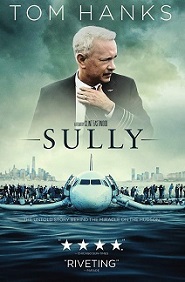
|
American Rhetoric: Movie Speech "Sully" (2016)
Captain Sullenberger Testifies Before the NTSB
[Video begins at the end of a simulation run with a successful plane landing.]
Ben
Edwards: Multiple runaways, airports, two successful landings. We are
simply mimicking what the computer already told us.
Captain Chesley 'Sully' Sullenberger: Can we get serious now?
Captain Sully: We've all heard about the computer simulations, and now we are
watching actual sims, but I can't quite believe you still have not taken
into account the human factor.
Captain Sully: No one warned us. No one said, "You are going to lose both engines at a lower altitude than any jet in history. But, be cool, just make a left turn for LaGuardia like you're going back to pick up the milk." This was dual engine loss at 2800 feet followed by an immediate water landing with 155 souls on board. No one has ever trained for an incident like that.
No one.
I'd like to know how many times the pilot
practiced that maneuver before he actually pulled it off. I'm not
questioning the pilots; they're good pilots. But they've clearly been
instructed to head for the airport immediately after the bird
strike. You've allowed no time for analysis or decision making. In these
simulations, you've taken all of the humanity out of the cockpit. How
much time did the pilots spend planning for this event, for these
simulations? You are looking for human error. Then make it human.
Porter: Your reaction-decision time will be set at 35 seconds.
Edwards: Upload the link. Return to LaGuardia -- now with an added 35- second delay in response time.
Porter: Let's try Teterboro.
Edwards: Upload the link, please. [Simulation runs with modified parameters. The plane crashes.]
Captain Sully: Does anyone need to see more simulations? First Officer Skiles: Now that we've seen what could have happened, can we listen to what actually did? Porter: We will look at all the results at a later date. Elizabeth? Davis: For the record, this is the CVR of U.S. Airways Flight 1549, January 15th, 2009. Gentlemen, headsets.
Captain Sully: I need to take a quick break. Porter: Alright folks, I'd like to call this hearing back to order. If we could settle, please. Take your seats. That is honestly the first time that I've listened to a crash recording, while actually sitting with the Captain and the First Officer. It's extraordinary. First Officer Skiles: That was no simulation. Porter: No, it wasn't. Davis: Gentlemen, I want to inform you that the left engine has been recovered. We just received a comprehensive report. There was extensive damage to both the guide vanes and fan blades at the engine. Five compressor blades were fractured, and eight variable guide vanes missing. Captain Sully: So, no thrust. Davis: As you testified, it was completely destroyed. The ACARS [aircraft communications addressing and reporting system] data was wrong. I’d like to add something on a personal note. I can say with absolute confidence that, after speaking with the rest of the flight crew, with bird experts, aviation engineers, after running through every scenario, after interviewing each player, there is still an X in this result. And it’s you, Captain Sullenberger. Remove you from the equation and the math just fails.
Captain Sully: I disagree. It
wasn’t just me. It was all of us. It was Jeff and Donna and Sheila and
Doreen and all of the passengers, the rescue workers, the air traffic
control, and ferryboat crews, and the scuba cops. Davis: First Officer Skiles, is there anything you’d like to add? Anything you would have done differently, if you had to do it again? First Officer Skiles: Yes. I would have done it in July. |
|
© Copyright 2001-Present. |
